Donald Trump: Unchained and unapologetic
- Published
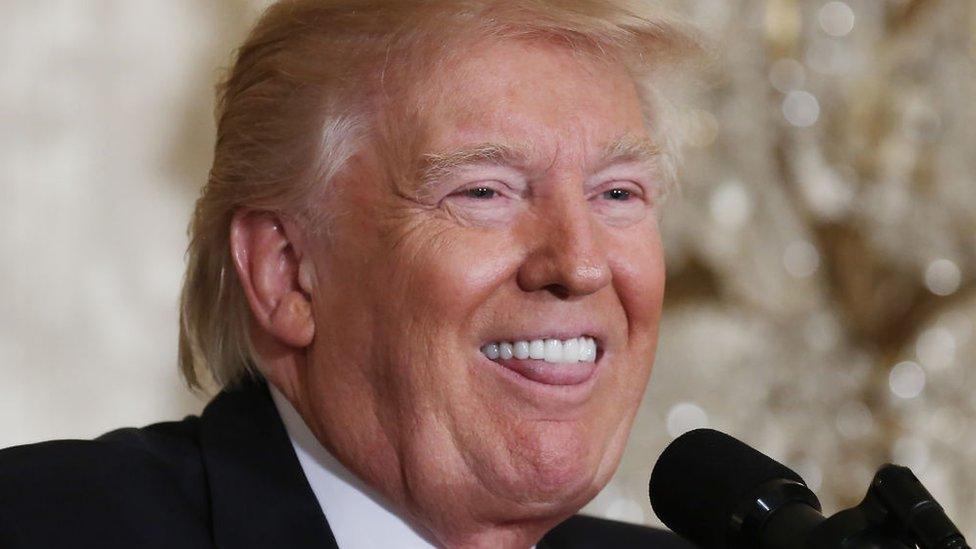
Donald Trump reportedly started work in the Oval Office on Thursday morning and told his staff he wanted to hold a press conference that day.
And so he did. Boy, did he.
The event, ostensibly an announcement of the president's new pick for labour secretary, was anything but routine. New nominee Alexander Acosta wasn't even in attendance - and it probably wasn't a bad thing that he missed out, since he quickly became an afterthought to the 76-minute free-form scrum that ensued.
So much for White House message discipline. Instead, it was Trump being Trump. The off-the-cuff style got him elected president, of course, so perhaps it's how he will reboot his four-week-old (!) presidency. Donald Trump was off the leash - just the way he seems to like it.
Here are some of the highlights.

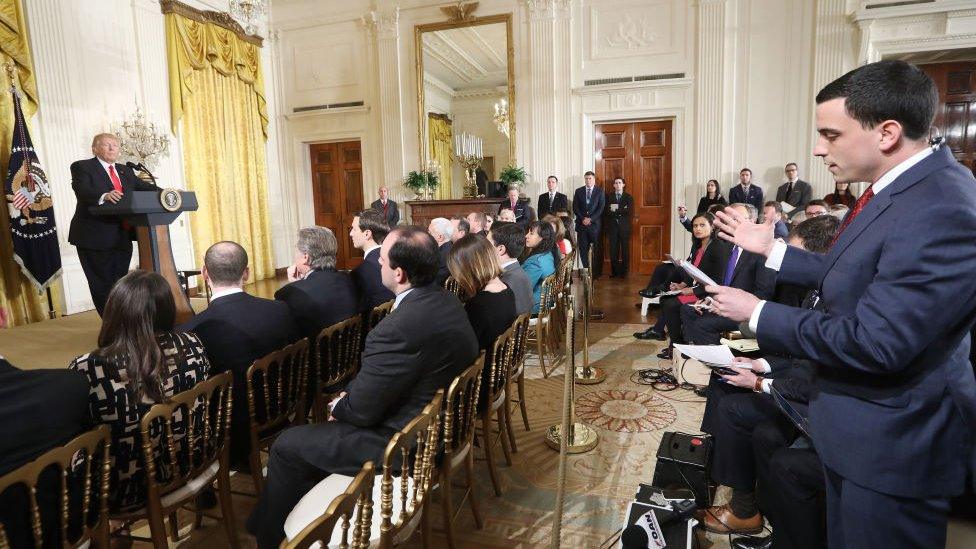
"The leaks are absolutely real; the news is fake."
Thursday's press conference was Trump v the Media, round eleventy-billion.
Mr Trump said mainstream journalists were the voice of a "broken system" of special interests that he is challenging - which can only be catnip for his base and a way of insulating himself against the recent barrage of negative stories.
When pressed on the simmering scandal over former National Security Adviser Michael Flynn's contacts with Russia and how the White House handled them, the president parried and then went after "dishonest" reporters who should be "ashamed" about inaccurate reporting based on illegal leaks (the president did not acknowledge the apparent contradiction in such a statement).
He blamed reporters for the New York Times and Wall Street Journal for not directly contacting him before running unflattering stories, as though they had his personal mobile number.
He even engaged in a bit of presidential concern-trolling, telling a CNN reporter his network would "do much better by being different".
"I started off today by saying that it's so important to the public to get an honest press," Mr Trump continued. "The public doesn't believe you people anymore. Now, maybe I had something to do with that. I don't know. But they don't believe you."
Mr Trump seemed to be at his happiest in this back-and-forth with hostile reporters over whether or not the media are honest - and with good reason. While journalists care deeply about the reputation of their profession, the general public probably views it as so much navel-gazing.
Every minute debating the impartiality and truthfulness of the press is a battle fought on terrain friendly to the president.

Trump was challenged by NBC on his false election boast
"I guess it was the biggest Electoral College win since Ronald Reagan."
Mr Trump has a habit of making statements that have, shall we say, a sometimes distant relationship with reality. He often couches the remarks in phrases like "I've heard", "people are saying", or "I guess".
Such was the case when he turned once again - in the scripted portion of his press conference, no less - to the size of his Electoral College victory last November.
In a bit of a twist, however, a reporter from NBC, Peter Alexander, called him on it minutes later.
He said that Barack Obama and Bill Clinton posted bigger margins of victory. Mr Trump replied that he was referring to Republican presidents.
Alexander countered that George HW Bush had a bigger win, too.
"Why should Americans trust you when you accuse the information they've received as being fake, when you provide information that's not accurate?" he asked.
Trump replied that it was information he "was given" and had "seen around", before saying that it was still a "very substantial victory" - a claim much more difficult to disprove.
President Trump, like Candidate Trump, has seemed invulnerable to fact-checkers, perhaps in part because he's moved on to a hundred different topics before the media watchdogs can catch up.
Thursday, for at least a brief moment, was different.

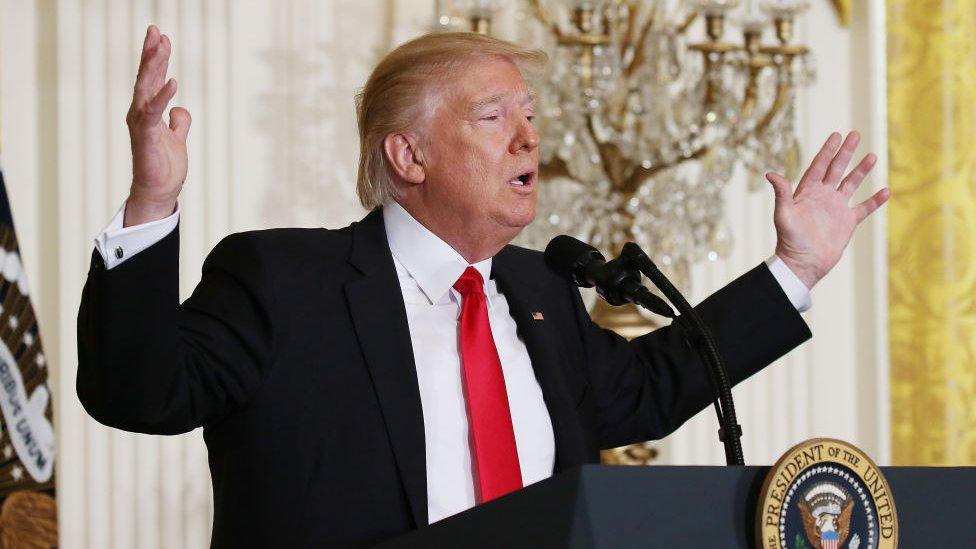
"I don't think there's ever been a president elected who in this short period of time has done what we've done."
The event on Thursday was billed as a press conference, but for the first half-hour it seemed more like an unpolished mid-day State of Union address. It was a chance for the president to talk over the gathered heads of the journalists in remarks broadcast on three of the four major US commercial networks and all the cable news outlets.
He spoke about the jobs he's brought back to the US - anecdotal and small-bore though they may be. He spoke of "productive talks" he's had with world leaders and the request he's made for his military to come up with a plan to defeat the so-called Islamic state.
He cited executive actions withdrawing from the Trans-Pacific Partnership and cutting back on government regulations. He boasted of task forces created, councils formed and agency co-ordination instructed.
And he touted his immigration efforts - a key piece of which is currently suspended pending court review.
"This last month has represented an unprecedented degree of action on behalf of the great citizens of our country," Mr Trump asserted again. "And we have not even started the big work yet."
That last part is definitely true. While the Trump administration has seemed to be in a flurry of activity, legislatively there has been relatively little accomplished. Within the first four weeks of his presidency, Mr Obama had signed into law a measure increasing protection for women's wages in the workplace and a massive economic stimulus bill that included more than $800bn in new federal spending.
After four weeks, Mr Trump still has 98% of his presidency ahead of him. The start has been rocky, and less accomplished than he says, but the jury is still out.

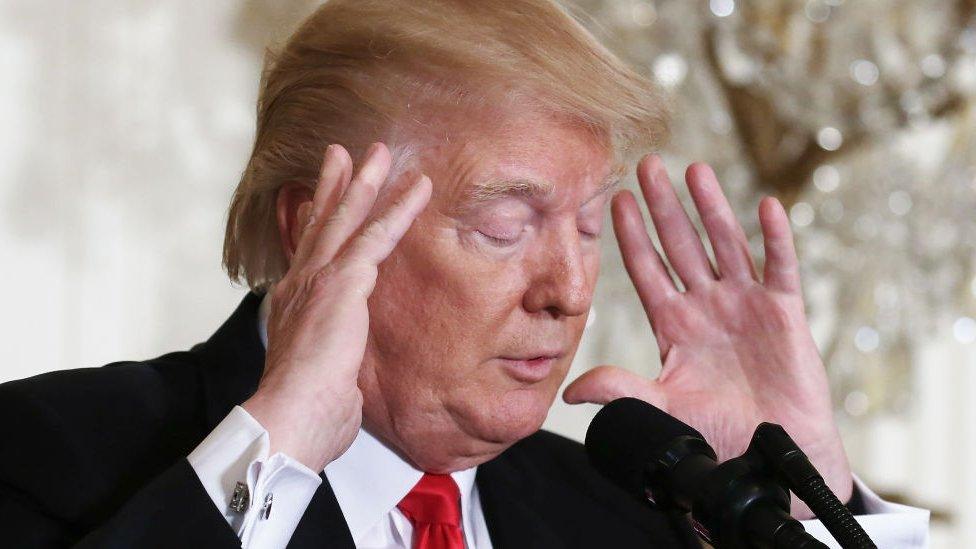
"This administration is running like a fine-tuned machine, despite the fact that I can't get my cabinet approved."
One of the criticisms that seems to irk Mr Trump the most is that his presidency has been beset by "chaos" and mismanagement.
Mr Trump lays part of the blame at the feet of Democrats, whom he says have been slow to approve his top-level cabinet appointments.
While part of this assuredly true, as Democrats slow-walked several of his nominees, others have been tardy because there were delays in submitting vetting paperwork or in the announcement of the nominations.
Perhaps of greater cause for concern is the lack of lower-level appointments announced. In key departments like state and treasury, the under-secretary slots remain largely unfilled.
Then there's the ongoing palace intrigue within the White House, which Mr Trump glossed over. He said that his chief of staff, Reince Priebus, is "working so hard just putting out fires" - but some of those fires are coming from within his own administration.
In one, external Washington Post story, an unnamed White House official said Priebus had to "become more competent". There's talk of rival factions within the Trump team, with pragmatists like Priebus squared off against longtime Trump true-believers like Steve Bannon and Stephen Miller.
When asked by the BBC's Jon Sopel about one of the most-cited example of White House chaos - the confusion surrounding the administration's rollout of the Mr Trump's immigration order - the president was defiant.
"We had a very smooth rollout of the travel ban," he said. "But we had a bad court."
The court decisions Mr Trump was apparently referencing - either by the Seattle judge who suspended implementation of the ban or the appellate court that upheld the injunction - came well after the first few unruly days of implementation, however, when US immigration officials seemed uncertain of how to apply the broadly worded order.
Perhaps "chaos" is too strong a word, but "smooth" is downplaying the confusion, particularly for permanent US residents from Iran, Iraq and other targeted nations who were left wondering whether they could safely enter the US.

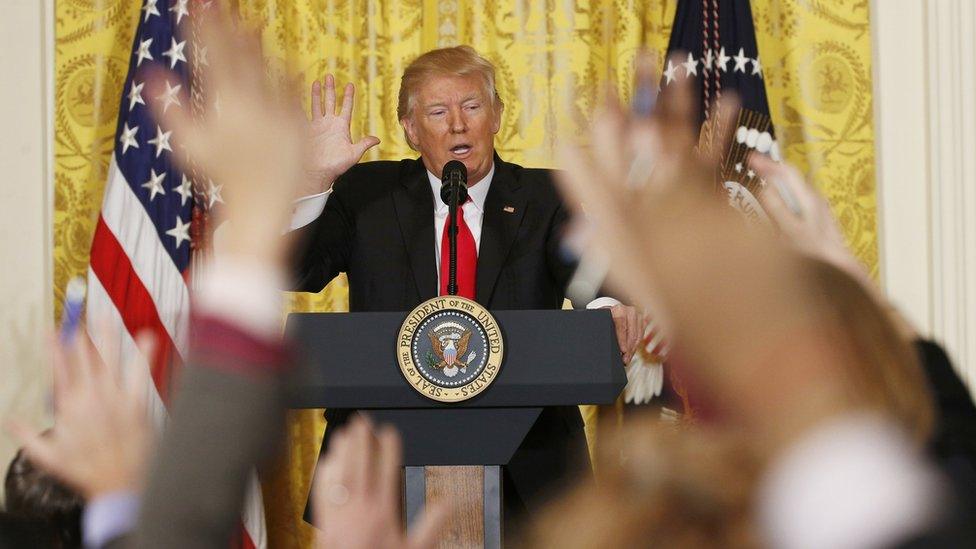
"I think Melania is going to be outstanding."
After berating a CNN reporter, calling Jon Sopel and BBC News "another beauty" and repeatedly telling a Jewish reporter asking about anti-Semitism to be quiet, Mr Trump finally found a question he liked - from an independent reporter named Kyle Mazza.
"Can you tell us all the things Melania does for the country?" he asked, referring to the president's wife.
"That is what I call a nice question," Mr Trump responded, before extolling the virtues of the first lady.
"I've known her for a long time," he said. "She was a very successful person. She was a very successful model. She did really well."
Mr Trump had been criticised for only calling on friendly reporters over the course of the last three press availabilities - all joint appearances with foreign leaders where a total of six questions from US journalists were permitted. Mr Trump chose conservative news outlets like Townhall, the Daily Caller and Newsmax over traditional mainstream media reporters.
On Thursday, however, Mr Trump took the media's best shot - although he carped about how he'd be portrayed as "ranting and raving" in the subsequent coverage.
He may not have ranted and raved, but it was a most unusual press conference nonetheless.